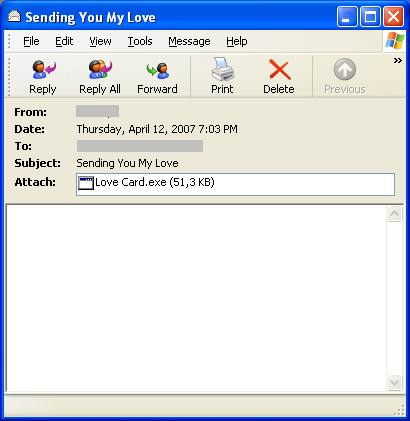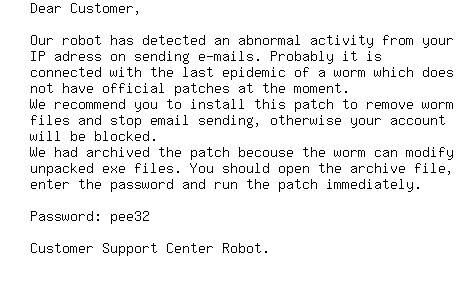Email-Worm:W32/Zhelatin.CT
Summary
The Zhelatin.CT worm started to spread on April 13th, 2007. The worm spreads in emails with love-related subjects and with attachments named "Love Card.exe", "Greeting Card.exe" and so on. A bit later the same variant spread using security-related subjects.
Removal
Based on the settings of your F-Secure security product, it will either move the file to the quarantine where it cannot spread or cause harm, or remove it.
A False Positive is when a file is incorrectly detected as harmful, usually because its code or behavior resembles known harmful programs. A False Positive will usually be fixed in a subsequent database update without any action needed on your part. If you wish, you may also:
-
Check for the latest database updates
First check if your F-Secure security program is using the latest updates, then try scanning the file again.
-
Submit a sample
After checking, if you still believe the file is incorrectly detected, you can submit a sample of it for re-analysis.
Note: If the file was moved to quarantine, you need to collect the file from quarantine before you can submit it.
-
Exclude a file from further scanning
If you are certain that the file is safe and want to continue using it, you can exclude it from further scanning by the F-Secure security product.
Note: You need administrative rights to change the settings.
Technical Details
The functionality of the Zhelatin.CT worm variant is similar to Zhelatin.CQ , however the subjects and attachment names it uses are different.
On April 13th several emails with love themed subjects were seen in the wild. While some of the subjects are a rehash of previously used subjects such as Sending You My Love, The Dance of Love, and When I'm With You, others are new:
- A Dream is a Wish
- A Is For Attitude
- Eternal Love
- Eternity of Your Love
- Falling In Love with You
- Hugging My Pillow
- Inside My Heart
- Kisses Through email
- Our Journey
- Sent with Love
- When Love Comes Knocking
- You're In My Thoughts
- You're the One
The email messages themselves have no text, instead, they have attached executables with romantic sounding filenames. These include:
- Love Card.exe
- Love Postcard.exe
- Greeting Card.exe
- Postcard.exe
Here is an example of the worm's email:

A second run occurred after a few hours. This time, the subjects were security related:
- ATTN!
- Spyware Alert!
- Virus Alert!
- Worm Alert!
- Worm Detected!
Furthermore, the message body is an image file which advises the receiver to patch their systems. Also included within the image is a password in order to extract the attachment. Here is an example:

Something new to the Zhelatin family is the use of a password protected Zip archive as an attachment. The filenames vary but they have the following format:
- patch-[4 to 5 random numerical characters].zip
- hotfix-[4 to 5 random numerical characters].zip
The executable contained within the Zip archive has the same name as that of the archive but with an EXE extension.
)
Protect your devices from malware with F‑Secure Total
Protecting your devices from malicious software is essential for maintaining online security. F‑Secure Total makes this easy, helping you to secure your devices in a brilliantly simple way.
- Award-winning antivirus and malware protection
- Online browsing, banking, and shopping protection
- 24/7 online identity and data breach monitoring
- Unlimited VPN service to safeguard your privacy
- Password manager with private data protection
More Support
Community
Ask questions in our Community .
User Guides
Check the user guide for instructions.
Submit a Sample
Submit a file or URL for analysis.